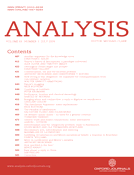-
Views
-
Cite
Cite
Peter Smith, Mathematical Thought and its Objects, Analysis, Volume 69, Issue 3, July 2009, Pages 549–557, https://doi.org/10.1093/analys/anp086
Close - Share Icon Share
Extract
Needless to say, Charles Parsons's long awaited book1 is a must-read for anyone with an interest in the philosophy of mathematics. But, as Parsons himself notes, this has been a very long time in the writing. Its chapters extensively ‘draw on’, ‘incorporate material from’, ‘overlap considerably with’ or ‘are expanded versions of’ papers published over the last twenty-five or so years. What we are reading is thus a multi-layered text with different passages added at different times. And this makes for a rather bumpy read. There is another route Parsons could have taken: he could have reprinted the relevant papers with postscripts, and then top-and-tailed the collection with a preface and added concluding reflections. It must sound very ungrateful, but I rather suspect that that might have worked better.
Much of the book is about arithmetic. But Parsons has woven into the discussion claims about mathematics more generally and about set theory in particular. We might well have a basic worry about this structure: for do defensible claims about the ontology and epistemology of arithmetic have to be generalizable to apply to more infinitary mathematics? For example, suppose you are attracted to a Hellman-like modal structuralist account of arithmetic: then should you think it a problem if you suspect that such an account can not readily be extended to cope, e.g., with set theory (since you boggle at the idea of possible worlds free of abstracta but with enough structure to somehow model ZFC)? Parsons himself seems to waver over such questions. So for present purposes, I will focus just on arithmetic, and in what follows I will revisit two of the most familiar Parsonian themes, his views on structuralism as an account of the ontology of arithmetic, and his exploration of the role of intuition in grounding arithmetical knowledge.




